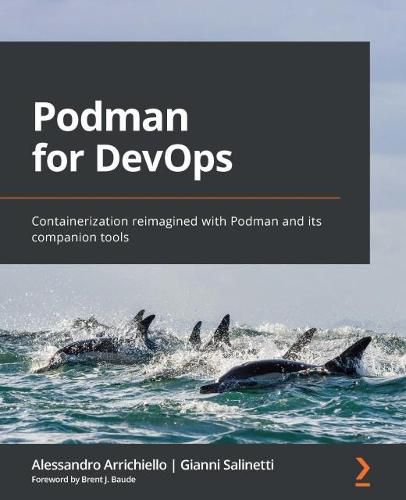Readings Newsletter
Become a Readings Member to make your shopping experience even easier.
Sign in or sign up for free!
You’re not far away from qualifying for FREE standard shipping within Australia
You’ve qualified for FREE standard shipping within Australia
The cart is loading…






This title is printed to order. This book may have been self-published. If so, we cannot guarantee the quality of the content. In the main most books will have gone through the editing process however some may not. We therefore suggest that you be aware of this before ordering this book. If in doubt check either the author or publisher’s details as we are unable to accept any returns unless they are faulty. Please contact us if you have any questions.
Build, deploy, and manage containers with the next-generation engine and tools
Key Features
Discover key differences between Docker and Podman Build brand new container images with Buildah, the Podman companion Learn how to manage and integrate containers securely in your existing infrastructure
Book DescriptionAs containers have become the new de facto standard for packaging applications and their dependencies, understanding how to implement, build, and manage them is now an essential skill for developers, system administrators, and SRE/operations teams. Podman and its companion tools Buildah and Skopeo make a great toolset to boost the development, execution, and management of containerized applications.
Starting with the basic concepts of containerization and its underlying technology, this book will help you get your first container up and running with Podman. You’ll explore the complete toolkit and go over the development of new containers, their lifecycle management, troubleshooting, and security aspects. Together with Podman, the book illustrates Buildah and Skopeo to complete the tools ecosystem and cover the complete workflow for building, releasing, and managing optimized container images. Podman for DevOps provides a comprehensive view of the full-stack container technology and its relationship with the operating system foundations, along with crucial topics such as networking, monitoring, and integration with systemd, docker-compose, and Kubernetes.
By the end of this DevOps book, you’ll have developed the skills needed to build and package your applications inside containers as well as to deploy, manage, and integrate them with system services.
What you will learn
Understand Podman’s daemonless approach as a container engine Run, manage, and secure containers with Podman Discover the strategies, concepts, and command-line options for using Buildah to build containers from scratch Manage OCI images with Skopeo Troubleshoot runtime, build, and isolation issues Integrate Podman containers with existing networking and system services
Who this book is forThe book is for cloud developers looking to learn how to build and package applications inside containers and system administrators who want to deploy, manage, and integrate them with system services and orchestration solutions. This book provides a detailed comparison between Docker and Podman to aid you in learning Podman quickly.
$9.00 standard shipping within Australia
FREE standard shipping within Australia for orders over $100.00
Express & International shipping calculated at checkout
This title is printed to order. This book may have been self-published. If so, we cannot guarantee the quality of the content. In the main most books will have gone through the editing process however some may not. We therefore suggest that you be aware of this before ordering this book. If in doubt check either the author or publisher’s details as we are unable to accept any returns unless they are faulty. Please contact us if you have any questions.
Build, deploy, and manage containers with the next-generation engine and tools
Key Features
Discover key differences between Docker and Podman Build brand new container images with Buildah, the Podman companion Learn how to manage and integrate containers securely in your existing infrastructure
Book DescriptionAs containers have become the new de facto standard for packaging applications and their dependencies, understanding how to implement, build, and manage them is now an essential skill for developers, system administrators, and SRE/operations teams. Podman and its companion tools Buildah and Skopeo make a great toolset to boost the development, execution, and management of containerized applications.
Starting with the basic concepts of containerization and its underlying technology, this book will help you get your first container up and running with Podman. You’ll explore the complete toolkit and go over the development of new containers, their lifecycle management, troubleshooting, and security aspects. Together with Podman, the book illustrates Buildah and Skopeo to complete the tools ecosystem and cover the complete workflow for building, releasing, and managing optimized container images. Podman for DevOps provides a comprehensive view of the full-stack container technology and its relationship with the operating system foundations, along with crucial topics such as networking, monitoring, and integration with systemd, docker-compose, and Kubernetes.
By the end of this DevOps book, you’ll have developed the skills needed to build and package your applications inside containers as well as to deploy, manage, and integrate them with system services.
What you will learn
Understand Podman’s daemonless approach as a container engine Run, manage, and secure containers with Podman Discover the strategies, concepts, and command-line options for using Buildah to build containers from scratch Manage OCI images with Skopeo Troubleshoot runtime, build, and isolation issues Integrate Podman containers with existing networking and system services
Who this book is forThe book is for cloud developers looking to learn how to build and package applications inside containers and system administrators who want to deploy, manage, and integrate them with system services and orchestration solutions. This book provides a detailed comparison between Docker and Podman to aid you in learning Podman quickly.